Despite concerns from public health experts and Chicago residents, the city’s top officials have found no evidence that Lollapalooza was a superspreader event.
Out of 385,000 people who attended the music festival, just 203 have tested positive in the two weeks since the event began.
Those 203 include 127 who were vaccinated and 76 unvaccinated.
The Chicago Department of Public Health estimated that the vast majority of concert attendees – about 90 percent – were vaccinated.
The event demonstrates that large gatherings may still be safely held during the Indian ‘Delta’ variant surge, if the event is held outdoors and the majority of the crowd is vaccinated.
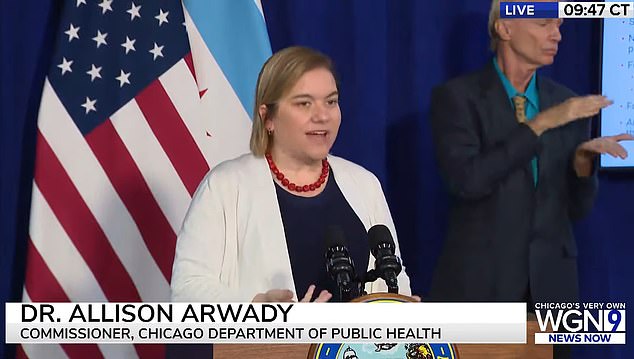
Lollapalooza was not a superspreading event with just 203 people testing positive, according to data released Thursday from the Chicago Department of Public Health. Pictured: Chicago health commissioner Dr Allison Arwady holds a press conference about city Covid numbers
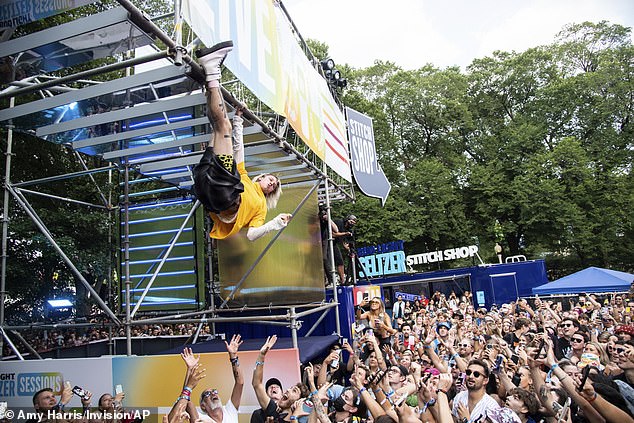
Lollapalooza drew massive crowds, over 350,000 people in total. Pictured: Machine Gun Kelly performs at the festival on July 31
Lollapalooza, an annual four-day music festival in Chicago, Illinois, became a major concern for public health experts this year as the show went on despite Covid concerns.
The city’s Covid case rate leading up to the festival – which took place in late July – was five times higher than it had been one month prior, according to Time magazine.
The festival drew more than 100,000 people each day – and those people weren’t required to wear masks.
While the festival did require attendees to provide proof of vaccination or a negative Covid test result, videos of the event showed that these cards were not carefully checked.
Chicago residents worried that the festival would be a superspreading event, meaning that it would kick off a massive outbreak in the city and surrounding areas.
According to the city’s public health commissioner, however, Lollapalooza was in fact not the superspreading event that many had feared.
August 12 marks two weeks since the first day of the festival.
Case spikes from a superspreading event typically appear about two weeks after the event, making this the appropriate time to provide an update, said Commissioner Dr Allison Arwady.
In a Thursday press conference, Arwady announced that a total of 203 cases have been connected to Lollapalooza so far.
That’s out of about 385,000 festival attendees in total.
Out of the 203 cases, 127 of the attendees were fully vaccinated and 76 were not.
These numbers are not surprising, Arwady said, because the vast majority of the crowd was vaccinated – about 90 percent had received their jabs, the public health department estimated.
‘We’ve had no unexpected findings at this point,’ Arwady said.
‘There’s no evidence at this point of a superspreader event, and there’s no evidence of substantial impact to Chicago’s epidemiology.’
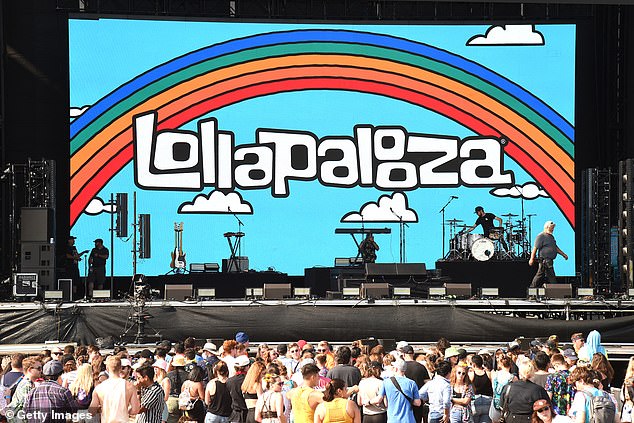
Chicago officials estimated that about 90 percent of Lollapalooza attendees were vaccinated. Pictured: A view of the festival stage on August 1
Based on estimates of the festival’s vaccination rate, the public health department calculated that about four in every 10,000 vaccinated attendees got Covid.
Among unvaccinated attendees, the risk was much higher: 16 out of every 10,000 attendees got Covid.
The city identified these Lollapalooza cases through contact tracing – asking Chicago residents who tested positive whether they’d attended the festival.
Chicago’s public health department also put out a nationwide alert, requesting other cities and states to submit information for any cases linked to Lollapalooza.
Plus, the department conducted supplemental interviews of anyone who tested positive and attended the festival.
This process is not able to specifically prove that attendees got sick at Lollapalooza, Arwady said.
Attendees may also have been infected at bars and restaurants or other high-risk locations outside the festival.
In addition to contact tracing, the city public health department is monitoring data from local hospitals to identify any rise in Covid symptoms.
‘We did not see increases or additional cases coming in through the emergency department,’ Arwady said.
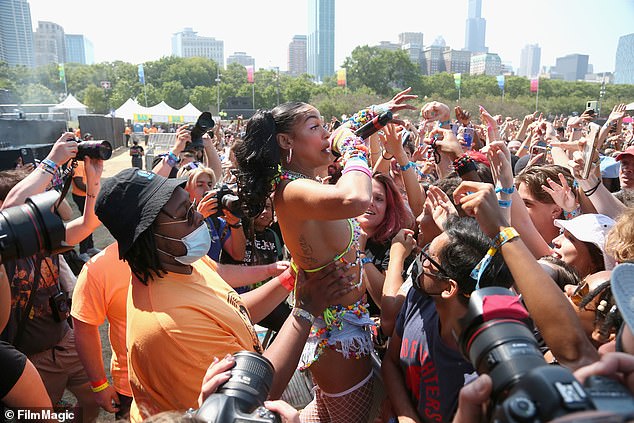
Chicago’s public health department continues to monitor cases linked to Lollapalooza. Pictured: Princess Nokia performs at the festival on August 1
Out of those 203 festival attendees who tested positive, 58 were Chicago residents, 138 were Illinois residents from outside the city, and seven were from out of state.
The vast majority were under age 30, and the majority were white, non-Hispanic.
Arwady noted that 13 of the Chicago residents who tested positive said they attended Lollapalooza after starting to experience symptoms – making it likely that they infected others at the festival.
Even if you’re vaccinated, Arwady said, it’s still important to stay home and get tested if you experience Covid symptoms.
The Chicago public health department will continue to monitor cases linked to Lollapalooza.
‘I expect we may see some more positives come in,’ Arwady said – particularly from other public health departments outside the city and state.
However, Arwady is confident that ‘we would have seen a surge if we were going to see a surge, at this point.’
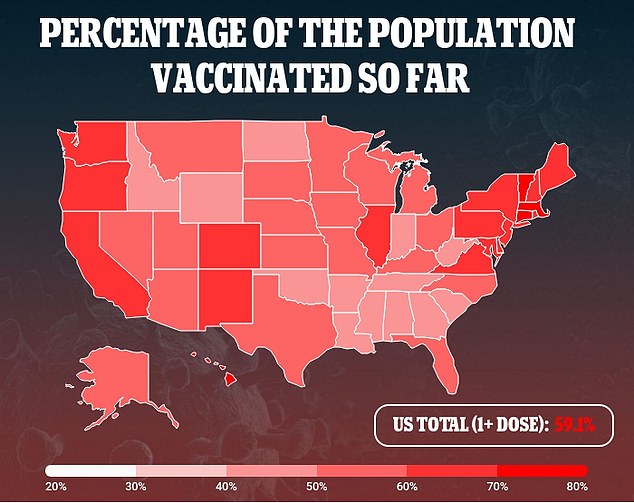
Lollapalooza’s success suggests that, despite Delta’s increased potential for Covid transmission, large events may still be held outdoors.
‘Even with the Delta variant, though we see the risk of transmission go up a lot,’ Dr Arwady said, ‘already we knew that the risk of being outside was so much lower than the risk of being inside that it’s much safer for these kinds of events.’
Chicago is also in a low-transmission range compared to much of the country.
The city’s test positivity rate is under five percent, hospitals are seeing manageable numbers of Covid patients, and the majority of city residents are vaccinated.
In New Orleans, on the other hand, cases are spiking – leading organizers to cancel the city’s Jazz Fest event, previously planned for early October. Arwady said she supported this move.
Overall – ‘Your biggest risk at this point is being unvaccinated,’ she said.
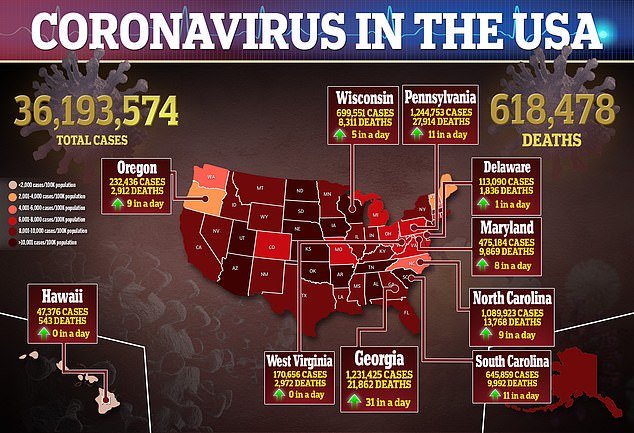
Source link : https://www.dailymail.co.uk/health/article-9887971/Maskless-Lollapalooza-did-NOT-super-spreader-event.html











